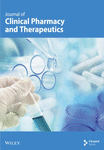Societal perceptions of community pharmaceutical services in Malta
Abstract
Objective: To assess the views of the Maltese general public on services provided by community pharmacies in Malta and their opinions on the proposed extended role for pharmacies
Method: An interviewer-administered structured questionnaire was used to interview 912 members of the public (395 males, 517 females)
Results: The majority of respondents (70·8%) visited a pharmacy at least once a month, with females visiting more frequently than males ( P< 0·01). Almost 31% stated that the main reason for visiting a pharmacy was to purchase prescribed medication, while 23·3% said that it was to obtain over-the-counter products. Women were more likely than men to be influenced by the pharmacist's advice when selecting an over-the-counter product ( P< 0·05). The majority of respondents (62·8%) said that they usually bought their medicines from the same pharmacy and loyalty to a particular pharmacy increased with age. When treating minor ailments, respondents were more likely to consult their doctor or self-treat rather than seek advice from the pharmacist. The proposed extended role of the community pharmacist found support with the public, e.g. 90·2% felt that the pharmacist should promote health education, with the preferred method suggested being through individual advice; 85·7% were in favour of screening and monitoring services and 85·6% felt that the keeping of patient medication records would be useful. Almost three-quarters (74·6%) of respondents said that they would be willing to participate in pharmaceutical care programmes. When asked to suggest new activities for community pharmacy, respondents were most in favour of the pharmacist offering more advice on the treatment of minor ailments
Conclusion: Overall, the results obtained are encouraging and Maltese pharmacists should plan to provide new services to the community in the future




